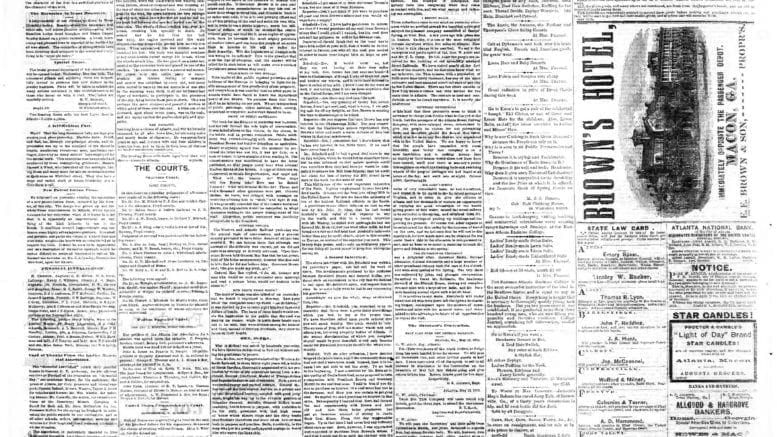This is a revised and expanded version of a story we originally ran in the earliest days of the Courier, in May of 2016, when our readership was less than on tenth the size it is now.
There is a guideline in journalism: “Don’t bury the lede.” A lede, sometimes spelled “lead”, is the opening of a news story. It’s the part that gets you interested in reading further. Burying the lede is opening with details that don’t grab your interest, and leaving the real point of the story for later. I found a good example of burying the lede in a set of companion articles in an old Atlanta newspaper.
I’ve been researching a 19th Century Atlanta community called Iceville, located on the Chattahoochee River where the neighborhood of Bolton is located now, directly across the river from Cobb County.
Iceville was named for the Atlanta Ice Company, which made ice from Chattahoochee water. The grounds of the company was a major picnic destination in the 1870s. It was within walking distance of the passenger rail terminal, and featured dancing, fishing, and tours of the ice company.
On May 14, 1873, the Atlanta Daily Herald ran the following story:
“Picnic of the Hibernian Society At Iceville
At half past eight o’clock yesterday morning, the Irish element of Atlanta’s population with many others got aboard the train and “Ho! for Iceville!” was the watchword. It was a beautiful morning — the girls looked charming as they always do — the young men had on clean shirts and were newly shaved, and the old ones were not much behind in the matter of dress …”
The story goes on to describe the efficiency of the organizers, some of the prominent attendees, and continues,
“Meantime, those who did not dance sought suitable trysting places, and doubtless the ‘old, old, story’ was told many times during the day. The beautiful Chattahoochee, rolling in full view, attracted much of the attention of lovers of nature, while the curious took occasion to inspect the ice works.”
The next paragraphs went on to describe the dancing, a fistfight, and regrets over the absence of two prominent members of the Hibernian Society.
The story closed with:
“Just after six o’clock the whistle blew, and the party, sated with rural pleasures, started for Atlanta in high spirits, but the gaiety was unfortunately all forgotten when the sad accident described in another column occurred. Otherwise the whole was such a scene as only the jolly, fun-loving Irish could set up.”
The “sad accident” was recounted under the next headline: “One of the Party Run Over and Killed by the Train.”
Here is the description that followed:
“One of the saddest and most heartrending events which it has ever been our lot to relate, occurred on the Western and Atlantic railroad two miles from this city on yesterday evening, about seven o’clock. R. M. Wall, a prominent and well-known Irish citizen of Atlanta, who has for a long while been connected with the house of Messrs. Clayton & Webb, on Whitehall street, as a salesman, was run over by four coaches of an excursion passenger train, and instantly killed. Being, as we are informed, a member of the Hibernian Benevolent Society, and also a member of the Committee of Arrangements on the excursion and picnic, he of course attended the annual picnic excursion of this society to Iceville yesterday. He went out on the regular excursion train which left the car shed at half past eight o’clock in the morning and had been at Iceville the whole day. A few minutes after six o’clock in the evening he got aboard the train to return to the city and when near the corporation limits was accidentally killed.
HOW THE ACCIDENT OCCURRED.
Mr. Wall at first took a seat in one of the coaches where he remained for a short space of time, when he was heard to remark that it was too warm inside for him, and immediately passed out at the door. He then stood on the platform for several minutes, and next seated himself on the iron railing on the platform of one of the coaches, placing his feet over the railing of the other. He had occupied this last position but about two minutes when the train which was nearing Bellwood Station, checked its speed and was running at the rate of about ten miles per hour. Ascending the grade in the road, the space between the two railings was widened, which threw his feet off and he fell on the track bed between the cars and across one of the iron rails. The wheels of four coaches ran over his breast, crushing him speedily to death. No sooner had he fallen than the bell was rung, the engine reversed and the train stopped—having meanwhile passed him seventy-five yards. When approached, life was extinct—he had breathed his last.”
To be fair to the Atlanta Daily Herald, newspapers had different standards in the 19th Century. But even then, making the transition between the two stories must have been jarring for readers.
You can visit an image of the original article from the Atlanta Daily Herald by following this link.

Fascinating article, Larry — thanks for sharing!